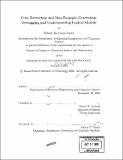Core extraction and non-example generation : debugging and understanding logical models
Author(s)
Seater, Robert Morrison
DownloadFull printable version (7.373Mb)
Other Contributors
Massachusetts Institute of Technology. Dept. of Electrical Engineering and Computer Science.
Advisor
Daniel N. Jackson.
Terms of use
Metadata
Show full item recordAbstract
Declarative models, in which conjunction and negation are freely used, are a powerful tool for software specification and verification. Unfortunately, tool support for developing and debugging such models is limited. The challenges to developing such tools are twofold: technical information must be extracted from the model, then that information must be presented to the user in way that is both meaningful and manageable. This document introduces two such techniques to help fill the gap. Non-example generation allows the user to ask for the role of a particular subformula in a model. A formula's role is explained in terms of how the set of satisfying solutions to the model would change were that subformula removed or altered. Core extraction helps detect and localize unintentional overconstraint, in which real counterexamples are masked by bugs in the model. It leverages recent advances in SAT solvers to identify irrelevant portions of an unsatisfiable model. Experiences are reported from applying these two techniques to a variety of existing models.
Description
Thesis (S.M.)--Massachusetts Institute of Technology, Dept. of Electrical Engineering and Computer Science, June 2005. Includes bibliographical references (p. 127-132).
Date issued
2005Department
Massachusetts Institute of Technology. Department of Electrical Engineering and Computer SciencePublisher
Massachusetts Institute of Technology
Keywords
Electrical Engineering and Computer Science.